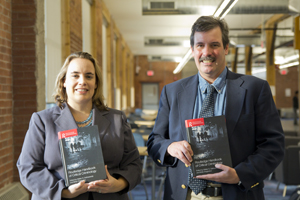UOIT professors publish innovative book on crime
November 11, 2011

Crime is a major resource drain on local communities. Regardless of where it occurs, on the street, in the home, or in the workplace the costs associated with crime are debilitating.
Dr. Walter DeKeseredy, professor, and Dr. Molly Dragiewicz, assistant professor, Faculty of Social Science and Humanities, gathered leading scholars from around the world to address these issues in the recently published Routledge Handbook of Critical Criminology.
“It seems everyone has an opinion about what to do about crime. However, few people look carefully at the research, which often points to policy solutions quite different than those in place,” explains Dr. Dragiewicz. Dr. DeKeseredy adds, “Whether we consider the skyrocketing costs of incarceration or the effects of current criminal justice practices on re-offense rates, it is clear that there is a pressing need for innovative approaches to preventing crime rather than simply reacting to it.”
The Routledge Handbook of Critical Criminology addresses this need by exploring short- and long-term policy proposals for crime prevention. The collection addresses some of the most pressing social problems of our time, including violence against women, white collar crime, environmental crime, hate crime, and human trafficking.
The Routledge Handbook of Critical Criminology is available in hardback and can be purchased from the Routledge website.



